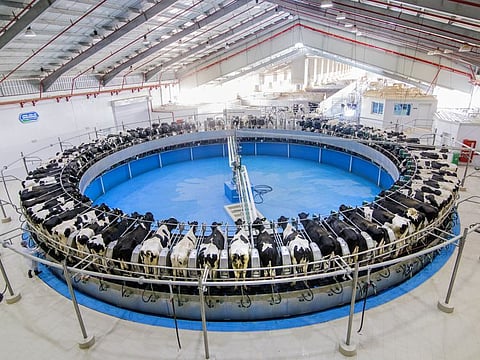UAE dairy brand Marmum takes on foreign domination
Marmum in Dh500m investment on new farm, Al Ain plant to combat Saudi brands’ 50% share

Dubai: The battle for supremacy among UAE dairy brands will not be won on dimes and fils. Instead, it’s mega investments that will be required to skim a greater share of the market.
That’s what Marmum Dairy is out to do with a Dh500 million investment split into two parts — one for a new plant and farm in Al Ain, and the second to upgrade its existing facility in Dubai. “These investments are not meant to create new capacity for any export markets,” said Sultan Al Jaberi, Managing Director.
“Our sole focus is to grab a bigger share of the UAE market — nothing more. Remember, just about half or even more of the current dairy product requirements of the UAE come from neighbouring countries. That’s what we to need to change. This is as much about ensuring local food security as anything.”
Targeting Saudi domination
For sure, brands such as Almarai and Nadec from Saudi Arabia retain a significant presence in supermarkets’ chill zones and even in the smaller grocery stores. This would be Marmum’s challenge. While it already has a presence in supermarkets, a key breakthrough would be to get into more standalone grocery outlets in a big way.
Market sources say that “baqalas” — the neighbourhood convenience stores — play an outsize role in categories such as dairy products, because of the ready access they can provide to residential areas. Once a brand makes it into these stores, the volumes will come on their own.
That’s where the Al Ain facility — the plant will be commissioned shortly — can lend a hand. (The farm has been operating for just over 18 months now.) “There are a lot of areas we want to reach still, and lots of products we don’t provide now but plan to,” said Al Jaberi. “Given the short shelf life, it’s a challenging business to be in.
“We chose Al Ain for the second plant because of multiple advantages — it’s less humid and the ideal place in the UAE to grow livestock. And there are the distribution advantages as well.”
Tightly controlled
Dairy prices in the UAE remain under tight control, which limits what brands can do on their retail prices. But on the plus side, the population continues to grow, ensuring steady double-digit growth in year-on-year demand. Also, each time a cafe opens up anywhere, it opens the doors to yet another potential client. (Cafés remain one of the fastest growing categories within the broader F&B space.) Other brands have also helped their numbers by getting into higher margin categories, through flavoured dairy-based beverages or those that cater to a health-conscious consumer. Of course, there is always “frozen desserts”, or ice-cream in other words. As for Marmum, it has plans to get into new categories, but will wait for market feedback to decide on what to do next and when.
Over the medium-term, the Al Ain plant will also help ramp up higher sales from the Abu Dhabi territory. Currently, Dubai and the Northern Emirates take up more than 60 per cent of the brand’s top-line.
Once the new plant is commissioned, it will add 91.25 million litres a year across all categories. The Dubai facility now has 32.8 million litres annually.
Change of hands
In 2017, Marmum Dairy was acquired by Elite Agro after Dubai Investments sold its 100 per cent stake in the entity. The brand as such has been in existence for more than 30 years.
But as far as Al Jaberi is concerned, the only focus for the brand remains is capturing more market share. When that happens, the numbers will have the right flavour to them.
In Oman, home grown brand makes an entry
Two years after its project announcement, Mazoon Dairy’s new plant has started feeding milk and other dairy products into the Oman marketplace. Its farm has the capacity for up to 25,000 cows, while the plant can produce 1 million litres of dairy products a day.
“This is in line with Oman’s strategy to achieve self-sufficiency in the food sector and produce farm fresh dairy that this are available to customers a few hours after production,” the company said in a statement.



